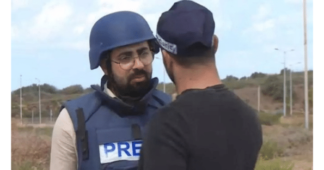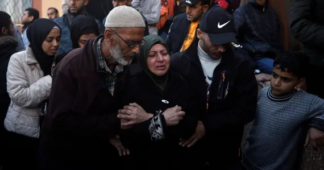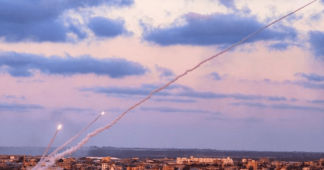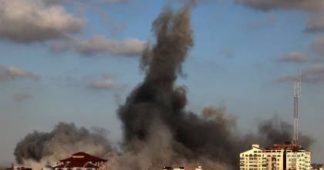By Nizar Nemer
Dec 25, 2023
Although Al Jazeera has become a top choice for those who want to follow the developments of the “Israeli” aggression on Gaza, its coverage is not without its flaws. This is observable through the double standards that are evident in its editorial policy and its coverage of the events. From describing the genocide as a “Israel-Hamas War” to refusing to recognize the status of martyrdom of those who are killed in southern Lebanon by enemy fire (even if they are journalists), there are countless examples.
Since the start of the “Israeli” aggression on Gaza following Operation Al-Aqsa Flood on October 7, 2023, Al Jazeera has taken a prime position in supporting the Palestinian cause and resistance. This position has allowed it to compensate for the loss of a large number of viewers that had previously occurred due to its biased coverage of the so-called “Arab Spring.” Consequently, the Qatari network has become a first choice for viewers who want to access the latest news related to the region, and it has enjoyed viewership rates that are many times higher than its competitors.
However, this does not mean that it is above criticism. In fact, many voices, particularly on social media, have criticized it by highlighting certain contradictions and double standards in the content it provides. The latest of these criticisms are observations about the difference in broadcast programming from day to day and the difference between the Arabic-language mother channel and the English-language channel that is affiliated with it. The difference between the two channels can be understood in light of the nature of the audience that each targets, but it has reached a point where it has become bizzare and repulsive. This has raised speculation about Al Jazeera’s true agenda and the extent to which it is influenced by Washington. It is worth noting that the Qatari government, which owns the channel, has close relations with the US government.
A prominent example of US influence in Al Jazeera’s journalistic policy was the reduction in the frequency of airing images of children targeted by the Israeli enemy in Gaza. These were images that garnered worldwide sympathy. This step came during the temporary ceasefire in November 2023 when Washington requested Doha “tone down” the intensity of its criticism towards “Israel,” given its impact on the awareness of Arab youth especially and the global public opinion overall. This reduction was also reflected in the decrease in the quantity and quality of field coverage, and when the correspondent Wael Al-Dahdouh was transferred to Khan Yunis in the southern region. However, the channel’s journalists remained targets of Israel’s brutal war machine, leading to the martyrdom of the photographer Samer Abu Daka (1978 – 2023) and the injury of Al-Dahdouh on December 15.
It seems that Al Jazeera does not care about its journalists as much as it claims. One might cynically observe that it actually gains popularity when they are targeted. Most of its news prior to that was from US or “Israeli” sources, including “Israeli” channel Keshet 12, “Israeli” newspaper Maariv, the spokesperson for the “Israeli” occupation forces Daniel Hagari, the families of settler “hostages,” and “Israeli” Prime Minister Benjamin Netanyahu, among others. However, following the attack on its journalists, it resumed airing some scenes of children being targeted, but with a heightened focus on clips released by the Palestinian resistance of their operations against the enemy.
In response to the above, Syrian writer Naram Serjoonn published an article on his blog entitled “Al Jazeera Performs the Dance of Salome* for the Arab People … and It Will Demand a Head in Return for Its Dance in Gaza.” He stated that the channel “is pleased to lose some reporters because that will grant it credibility. Just as the US killed the Kuwaiti journalist Tariq Ayoub (1967 – 2003), a correspondent for Al Jazeera during the US invasion of Baghdad, and Al Jazeera reclaimed ‘innocence’ following his death. Despite fueling the bloodbath of the Arab Spring, today the outlet will present its reporters’ injuries as a certificate of innocence, claiming to be targeted because it poses a threat to Israel.” Thus, the channel walks a tightrope, gaining viewers’ trust in some circumstances, while exploiting it politically in subsequent phases.
The constant shifting in Al Jazeera’s coverage according to circumstances is also present in its English-speaking channel, which generally targets a Western audience. It does not dedicate its full broadcast and bulletins to Palestine despite having the most airtime on the subject. In its coverage of Palestinian news, it focuses on what matters to the Western audience—similar to international and UN positions— demonstrations, boycotts, and calls for ceasefires. It almost entirely neglects what the Palestinian Resistance’s Military Media publishes, seemingly due to considerations of broadcasting in Western countries and fear of potential repercussions.
Consequently, a defeatist tone dominates the content of Al Jazeera English. Meanwhile it fails to showcase the capabilities of the resistance that prove the futility of the occupation’s actions and its inability to achieve any of its declared objectives. Mostly, its coverage involves the killing of innocent civilians. Al Jazeera’s English channel’s coverage of Palestinian resistance operations can be likened to how its Arabic-speaking channel deals with operations in Lebanon. It treats them as if they do not exist. However, despite this, Al Jazeera English plays a striking role in shaping public opinion in the West.
This is another episode in the ongoing saga of double standards since October 7. However, this time, the illness strikes viewers in their own homes, creeping in through the “virus” of Al Jazeera, which changes its performance according to circumstances, alongside the “bacteria” of Western channels that, if not for the risk of losing viewers, would not shed light on the suffering of Palestinians or validate their humanity at all.
[Translator’s note: The Dance of Salome refers to the story of Salome in the Gospel of Matthew 14. In the Biblical story, Salome, a Jewish princess and the daughter of Herodias, performs a sensual dance for King Herod in order to convince him into beheading John the Baptist who had been critical of Queen Herodias. Its usage in the article invokes the setting in which a provocative performance manipulates a viewer into defending an incestuous relationship among the ruling powers while eliminating those who oppose this relationship.]
Translation: Orinoco Tribune
We remind our readers that publication of articles on our site does not mean that we agree with what is written. Our policy is to publish anything which we consider of interest, so as to assist our readers in forming their opinions. Sometimes we even publish articles with which we totally disagree, since we believe it is important for our readers to be informed on as wide a spectrum of views as possible.











